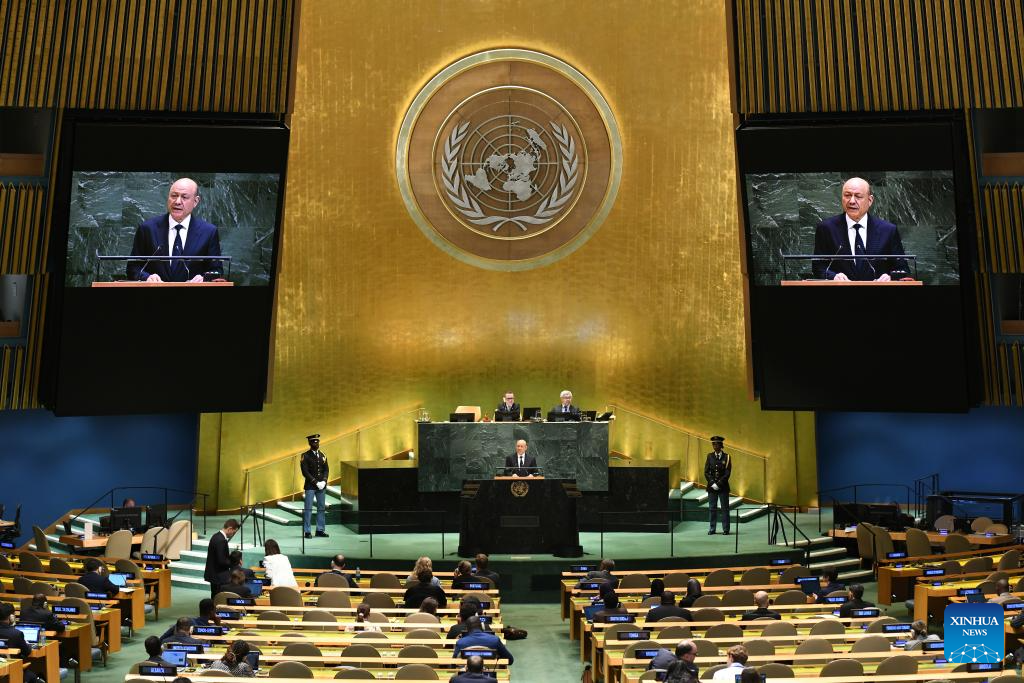
UNITED NATIONS - World leaders have voiced their support for the unifying function of the United Nations since the General Debate of the 80th UN General Assembly kicked off on Tuesday, as the world body is nearing its 80th anniversary on Oct 24, with honors and pains, as well as division in recent times, all the way along its establishment.
"The United Nations remains relevant, especially in these times of deep global uncertainty and crisis. It continues to be the only forum where all nations -- large and small -- have a seat and a voice," said President of Guinea-Bissau Umaro Sissoco Embalo on Thursday.
He stressed the importance of its related organizations and agencies, including the World Health Organization, the United Nations Children's Fund and the United Nations Development Programme, noting that such agencies provide treatment, education, vaccines and food, and protect millions while contributing to the fight against poverty.
ALSO READ: Chinese envoy urges containing spillover effects of Ukraine crisis
Also on Thursday, Montenegrin President Jakov Milatovic said that "despite its imperfections, the United Nations remains the only global institution where every nation has a seat and a voice and where international law remains the basis for international legitimacy."
Reflecting on the UN's founding, he noted that Montenegro was "born from the ashes of the Second World War." Cities like Warsaw, Berlin and Podgorica were devastated, yet leaders "looked to the future," believing "that light could emerge from darkness and that solidarity could triumph over despair." Without the UN, "much of our collective progress" would not exist.
Milatovic added that with multilateralism "being tested like never before" by conflict, "a wave of human rights violations," polarization and disinformation, the UN remains "indispensable" in a fragile world, a foundation to be defended and renewed.
Teodoro Nguema Obiang Mangue, vice-president of Equatorial Guinea, said that 80 years ago, the founding states established this organization, aspiring to build a multilateral system based on cooperation, respect for international law and the dignity of human beings.
He praised the UN for its achievements in preventing conflicts, supporting decolonization and advancing human rights, but cautioned that this anniversary "must serve as an opportunity for critical self-reflection."
Tackling challenges
On Wednesday, Sheikh Sabah Al-Khaled Al-Hamad Al-Sabah, crown prince of Kuwait, reiterated that any threat against a UN Security Council member is one against all member states, while spotlighting the recent "dangerous military escalations and expansion of conflicts." In particular, he condemned the "brutal Israeli aggression against Qatar."
Nigerian Vice-President Kashim Shettima told the General Debate that "the chaos that shadows our world is a reminder that we cannot afford the luxury of inaction."
While some have grown disillusioned with multilateralism, he reaffirmed that "existing structures are not set in stone," urging "real change, change that works, and change that is seen to work."
READ MORE: China calls for accelerated resolution of Palestinian question
Shettima outlined four priorities: debt relief and access to trade and finance, fair benefit from minerals, closing the digital divide, and reforming global governance.
"None of us can achieve a peaceful world in isolation," he said, adding that "a renewed commitment to multilateralism, not as a slogan but as an article of faith, remains our surest path forward."
Also on Wednesday, Serbian President Aleksandar Vucic sent a clear message about the United Nations by affirming that the world body must not become "a stage where giants wrestle while smaller countries hold their breath," but "a round table where every seat counts."
He emphasized that nations of the Global South are too often treated as chess pieces, even though they can be conveners and guarantors of cooperation. Serbia's engagement with partners is grounded in sovereignty, territorial integrity and respect for dialogue over division.
While addressing deep divisions within and between societies, Vucic warned of the dangers posed by eroded moral values, disinformation, and politically motivated violence.
Unfriendly voices
As its 80th birthday approaches, the United Nations still struggles to tackle various challenges, and not all voices are friendly and serve to unify a divided world.
US President Donald Trump spent the better part of an hour on Tuesday during the General Debate scolding the UN General Assembly, saying the UN was useless and that other countries were "going to hell."
READ MORE: China ready to work with all parties to implement GDI, says premier
"I may disagree with it sometimes, but I am so behind it," Trump said of the UN. Still, his administration has clawed back $1 billion in funding for the organization and has informed the US Congress of its intent to slash another $1 billion, adding to a funding shortfall. It has also withdrawn the United States from several UN agencies and the Paris Agreement.
The New York Times reported that "when world leaders converge on New York City this week for the annual gathering of the UN General Assembly, the organization will be observing its 80th anniversary. But the mood is far from celebratory, as wars rage around the world, a budget crisis looms, and questions abound about whether the UN is even relevant anymore."
"Year after year, UN officials and world leaders use the annual gathering to put forth lofty ideas and offer elaborate road maps for change. But tangible progress remains stubbornly elusive," it noted.
Against all these odds, UN Secretary-General Antonio Guterres repeatedly stressed the significance of safeguarding the unifying role of the world body in ever-changing and demanding circumstances.
"In a world where threats leap borders, isolation is an illusion. No country can stop a pandemic alone. No army can halt rising temperatures. No algorithm can rebuild trust once it is broken," said the UN chief.


